2008 年天津普通高中会考英语真题及答案
第一部分:英语知识运用(共两节,满分 30 分)
第一节:单项填空(共 15 小题;每小题 1 分,满分 15 分)
从 A、B、C、D 四个选项中,选出可以填入空白处的最佳选项。
1. — May I speak to Linda?
— Sorry, she is not in. Would you like to leave a ________?
A. game
B. book
C. message
D. newspaper
2. — I don’t know how to spend this weekend.
— What about _______ a picnic in the park?
A. have
C. had
D. having
3. — Mary, would you like to go to the cinema with me this evening?
B. to have
— ________, but I have a lot of homework to do.
A. I’d love to
C. No, I don’t like it
B. I don’t think so
D. I hate to go to the cinema
4. — Would you like some beef or chicken?
— _______. I’m full. Thank you.
A. Either
B. Both
C. Neither
D. No one
5. In the 19th century, gold was ________in California.
A. invented
B. discovered
C. warned
D. invited
6. — ________ weather! It’s raining.
— Bad luck! We have to stay at home all day.
A. What fine
B. How fine
C. How bad
D. What bad
7. — Look, Tom is playing football on the playground.
— It ________ be Tom. He has gone home.
A. shall not
B. needn't
C. can't
D. won't
8. — Jason...Jason! _______ the TV a little, please. It's too loud.
— Oh, but this is my favourite programme.
A. Turn down
B. Turn up
C. Turn in
D. Turn on
9. — I called you at eight last night, but there was no answer.
—Oh, sorry. I _______ dinner with my parents in a restaurant.
A. have
B. was having
C. am having
D. will have
10. —Do you know the girl _______ is reading under the tree?
— Yes. She is Nancy, the best singer of our school.
A. who
B. which
C. whom
D. she
11. — You look so beautiful today.
—
____. I had my hair cut yesterday.
A. Not really
C. It's not true
B. Thank you
D. With pleasure
12. — What do you think of the film?
— It is wonderful. I have never seen
one than this.
A. the best
B. the worst
C. a worse
D. a better
�
13. —Have you found any information about tigers on the Internet?
—Yes. But I don't know ________ it is useful for you.
A. which
B. what
C. whether
D. how
14. We will miss the first bus to TEDA ________ we get up early tomorrow morning.
A. if
B. unless
C. until
D. when
15. Both John and his friend _______ going to the museum tomorrow.
A. are
B. is
C. were
D. was
第二节:完形填空(共 15 小题;每小题 1 分,满分 15 分)
Early in the morning, my daughter came into my room and said, “Henry is not
in his
bed.”
“Maybe he is…,” I thought that he had gone
16
to watch TV. But he had
not. I
called out through the house. No answer. I looked everywhere,
17
outside.
Since it was Sunday, nobody was in a hurry. The streets were usually busy
. Any other time of the day I could explain
19
the five-year-old
18
but now they
were
boy had
gone. But at six a.m. on
tried--my garden, four blocks (借区) away. I
20
Day, I had no idea. There was only one place I hadn't
21
slowly toward it.
First block nothing. Second and third
22
. But at the end of the fourth
block, I saw
him coming
23
me.
"Where?" I asked as he got into the car.
"Where have you been?" I asked.
"To your
"
"Because," he said, "I woke up and
did you want to go there?" I asked.
26
24
25
," he answered and then cried. I took him into my arms.
it was Mother's Day. And I did not
have a
27
. I thought maybe I could find some flowers in your garden. But when I got
to the Apple
Street, I remembered I wasn't
28
to cross it myself."
Holding him tightly, I told him that
29
in any flower garden could ever
mean as
much to me as he.
This moment will always be clearly pictured in my
30
.
16. A. downstairs
17. A. excitedly
18. A. noisy
19. A. which
20. A. Children’s
21. A. drove
22. A. loud
23. A. from
B. home
B. slowly
B. quiet
B. what
B. Christmas
B. ran
B. empty
B. through
C. outside
D. under
C. happily
C. clean
D. finally
D. crowded
C. where
D. when
C. New Year’s
D. Mother’s
C. walked
C. small
D. flew
D. closed
C. toward
D. into
�
24. A. house
25. A. Which
26. A. remembered
27. A. fever
28. A. persuaded
29. A. everything
30. A. mind
B. garden
B. Where
B. pretended
B. dream
B. advised
B. nothing
C. shop
C. What
C. hoped
C. present
C. asked
C. anything
D. car
D. Why
D. promised
D. chance
D. allowed
D. something
B. hand
C. room
D. bed
第二部分:阅读理解(共 15 小题;每小题 2 分,满分 30 分)
A
As an overseas student (留学生) , you may find it difficult to make friends
in a new country. Being alone without your family, you will probably feel homesick
and a little uncomfortable in a new culture. Here are some suggestions to help you
make friends.
Firstly, it's a good idea to ring your family and friends at home and tell
them about your new life. Talk to your teachers and other overseas students. Share
your problems and feelings and you will soon feel a little better.
Secondly, it is very important to attend your classes and do your homework.
The more you learn, the more confident you will become. If you are learning a new
language you will learn quickly at the start, but then more slowly. Be patient with
yourself, because all learning takes time.
Thirdly, you should join a club at your school or college. There are many to
choose from— sports groups, movie groups, music groups. Remember that every time
you join in, you are helping yourself make new friends.
Finally, to make friends you really ought to learn about the new culture. As
you understand more about how people around you live and think, you will find it
easier to make friends. Ask questions and be interested. Some of these friends will
probably be your friends for life.
In a word, living in a new country and making friends is a valuable experience.
Face your
loneliness, then study hard and try to join a club and understand the culture. You
will probably make life-long friends.
31. How many suggestions does the writer make?
A. Two.
B. Four.
C. Seven.
D. Eight.
32. According to the passage, which of the following is TRUE?
A. You can't make life-long friends in a new country.
B. Learning a new language doesn't take time in a new country.
C. Joining a school club in a new country is a waste of time.
�
D. Try to learn about a new culture when you are abroad.
33. The word "homesick" in Paragraph 1 probably means _______?
A. feeling happy at home
C. hating to stay at home
B. missing home
D. getting tired of family life
34. While studying abroad, you'd better not _______.
A. study hard
C. keep your loneliness a secret
35. What is the passage mainly about?
B. call your friends
D. join a sports group
A. How to make friends in a new country.
B. How to learn a new language in a new country.
C. How to join a school club in a new county.
D. How to understand the culture in a new country.
B
A great man died today. He wasn't a world leader or a famous doctor or a war
hero or a sports figure and you will never see his name in the financial (金融)
pages. But he was one of the greatest men who ever lived. He was my father.
I guess you might say he was a person who was never interested in receiving
honours. He did ordinary things like paying his bill on time, going to church on
Sunday and serving as an officer in the Parent-Teacher-Association (家长教师联
合会) . He helped his kids with their homework and drove his wife to do shopping
on Thursday nights. He enjoyed driving his teenagers and their friends to and from
football games.
Tonight is my first night without him. I don't know what to do with myself.
I am sorry now for the times I didn't show him the proper respect. But I am grateful
for a lot of other things.
I am thankful that God let me have my father for 15 years. And I am happy that
I was able to let him know how much I loved him. That wonderful man died with a
smile on his face and satisfaction in his heart. He knew that he was a great success
as a husband and a father, a brother, a son and a friend. I wonder how many
millionaires (百万富翁 ) can say that.
36. What do we know about the writer?
A. He is in his thirties.
B. He is in his twenties.
C. He is 15 years old.
D. He is in his forties.
37. According to the passage, the writer's father was a/an _______.
A. ordinary man
B. war hero
C. famous doctor
D. world leader
38. Who drove the teenagers to and from football games?
A. The writer's mother.
�
B. The writer's father.
C. The writer's friend.
D. The writer's teacher.
39. Which of the following about the writer's father is NOT true?
A. He thought he himself was a good son.
B. He was kind and helpful to the teenagers.
C. He was not satisfied with his life.
D. He went shopping with his wife on Thursdays.
40. The best title for the passage would be _______.
A. A Sports Figure
B. My Family
C. A Millionaire
D. A Great Father
James Caviezel, a Hollywood star, has always dreamed big, but his road to
C
success wasn't
direct.
In college, Caviezel did quite well in basketball. Unfortunately, a foot injury
ended his basketball dreams. So he turned his determination into a new goal—acting.
In 1990, Caviezel landed a part in his first movie. The next year, at the age
of 23, he moved to Los Angeles. While working as a waiter, he won a few small TV
and movie roles. In 1998, he finally got his big chance. That year, he appeared
in the World War II movie The Thin Red Line. His successful performance brought
him more important parts. Over the next four years, Caviezel worked with well-known
directora such as Ang Lee in eight major films. In 2002, Caviezel played the role
of Jesus (耶稣) in The Passion of the Christ (耶稣蒙难记). He spent months preparing
for the part. He learned the ancient language that Jesus spoke. During the filming,
he suffered terrible physical pain and freezing cold weather. But his hard work
paid off. He received much praise for this role.
Following the success, Caviezel received good offers to star in advertisements
on TV. But
he refused them, for he worried that the advertisements would reduce the importance
of the film, The Passion. "I would disappoint people who got something special from
the film," he explained.
_______________________ He looks for
roles that encourage people and give them hope.
Caviezel is very busy but he also makes time to help raise money for poor people.
Although Caviezel has enjoyed much acting success, he is determined to make his
life valuable.
41. What does the passage tell us about Caviezel?
A. He is a kind and successful actor.
B. He spent years preparing for the role of Jesus.
C. He didn't do well in the film, The Thin Red Line.
D. He had no difficulty on his way to success.
42. "His hard work paid off' in Paragraph 3 probably means _______.
�
A. his hard work brought him nothing
B. he didn't need to work any more
C. someone took all his money
D. his hard work brought him success
43. Why did he refuse to star in advertisements on TV after acting Jesus?
A. He wasn't offered much money.
B. Advertisements on TV were boring.
C. It would reduce the importance of The Passion.
D. He was busy with a new movie role.
44. Which of the following would be the missing sentence in Paragraph 4?
A. Caviezel lost interest in movies.
B. Caviezel also chooses his movie roles carefully.
C. Caviezel was disappointed with his fans.
D. Caviezel wanted to make money from movies.
45. The right time order of the following events in Caviezel's career should be
________.
a. Caviezel appeared in The Thin Red Line.
b. Caviezel landed a part in his first movie.
c. Caviezel refused to star in advertisements on TV.
d. Caviezel played the role of Jesus.
A. b→a→d→c
C. c→d→b→a
B. c→b→d→a
D. b→c→a→d
第三部分:写作(共两节,满分 25 分)
第一节:阅读表达(共 5 小题;每小题 2 分,满分 10 分)
46. The film, Crouching Tiger, Hidden Dragon, belongs to a type of Chinese story
called wuxia.
As in the old wuxiastories, characters jump through the air every now and then,
with
beautiful movements. Wuxiafilms are popular in China, and they are now popular
in the
West too.
Wuxia films are popular not only ____________________________but also in the
West.
47. In April 2002, the number of mobile phone users in China reached 167 million.
At this point, China passed the US to become the largest mobile phone market
in the world. The number of mobile phone users in China is expected to reach
580 million by 2009.
With 167 million mobile phone users in 2002, China became
in the
world.
48. Paper won't exist in the future. Instead, there will be e-paper which people
will be able to use over and over again. This will develop in order to save natural
resources...People will download information and news articles from the Interact
every day onto e-paper.
�
In the future, people will probably use e-paper in order to save______________.
49. In English-speaking cultures, people have special ways of calling their family
members. Most people call their grandparents by their titles only, such as
Grandfather and Grandmother. Aunts and uncles are usually called by their names
and titles, such as Aunt Kathy or Uncle John. Brothers and sisters are called
by their names, not by titles.
The passage mainly tells us that _________________ in English-speaking
cultures.
50. We pour our waste into the rivers and the skies. Forests are being cut down
for industry. Some farms are turning into deserts. Many animals and plants are
disappearing….Our Earth is in danger.
In
our
____________________________________________.
第二节:书面表达(满分 15 分)
51.假如你是李华,春节将至,你的澳大利亚籍笔友 Robert 来信向你询问天津人如何庆祝
这个节日。请用英文写一封电子邮件向他简单介绍有关情况。
注意: 1.词数 100 左右;
Earth,
should
order
save
we
to
2. 信的开头与落款已为你写好,不记入所要求词数;
3. 方框内所提供的词和短语仅供参考
Useful Expressions
important festival, on the Eve, paper cut, colourful lights, new clothes, excited, relaxed,
watch special performances on TV, get together, make dumplings, set off firecrackers, stay
up late...
Dear Robert,
Glad to hear from you. I'm very happy to tell you how we celebrate the Spring
Festival.
Love from Li Hua
2008 年天津普通高中会考英语答案及评分参考
4.C
3.A
第 I 卷
第一、二部分(Key to l ~ 45)
1.C
11.B
21.A
31.B
41.A
第 II 卷
14.B
24.B
34.C
44.B 45.A
2.D
12.D
22.B
32.D
13.C
23.C
33.B
42.D 43.C
5.B
6.D
7.C
15.A
25.D
35.A
16.A
26.A
36.C
8.A
17.D
27.C
37.A
9.B
18.B
28.D
38.B
10.A
19.C
29.B
39.C
20.D
30.A
40.D
�
第三部分
第一节
46.in China
47.the largest mobile phone market
48.natural resources
49.people have special ways Of calling their family members
50.protect
environment/plant
trees/not
more
the
pour
waste
into
the
rivers/protect animals...
评分标准:
本题共 5 小题,每小题 2 分,满分 10 分。可参照以下标准赋分:
2 分
1 分
0 分
作答内容准确,符合题干要求;
语义完整:
语言通顺、连贯;
语法或单词拼写(含大小写)
正确无误;
回答内容基本符合题干要求;
语义基本完整;
语言基本通顺;
有个别语法或单词拼写(含
大小写)错误,但不影响理解;
没有作答;
所答内容完全不符合题干要求;
写出只言片语但不构成语义;
无语法可言;
无准确拼写之单词;
注:该部分答案不唯一,考生答案只要切合题意即可,如:第 50 题为半开放性试题,考生
写出与环保有关的内容即可。
第二节:书面表达
(一)评分原则:
1.本题总分为 15 分。按 5 个档次给分。
2.评分时,先根据短文的内容和语言初步确定其所属档次,然后以该档次的要求来衡量,
最后给分。
3.评分时,应注意的主要内容为:内容要点、应用词汇和语法结构的数量和准确性、上
下文的连贯性及语言的得体性。
4.内容要点可用不同方式表达。
5.紧扣主题的适当发挥不予扣分。
(二)内容要点
要点需包括以下内容:
1.介绍庆祝春节的相关活动,如:包饺子、放鞭炮、看电视节目、走亲访友等。(如
写
出其它信息,内容贴切即可)
2.有适当的结尾。
(三)各档次的给分范围和要求:
第 5 档:(12~15 分)
能写明全部要点;语言基本无误,结构完整,行文连贯,表意清楚,完全达到了预期
的写作目的。
第 4 档:(9~11 分)
能写明全部或大部分要点;有个别语言错误,但不影响意义表达;结构基本完整行文
基本连贯,表意基本清楚,达到了预期的写作目的。
第 3 档:(6~8 分)
�
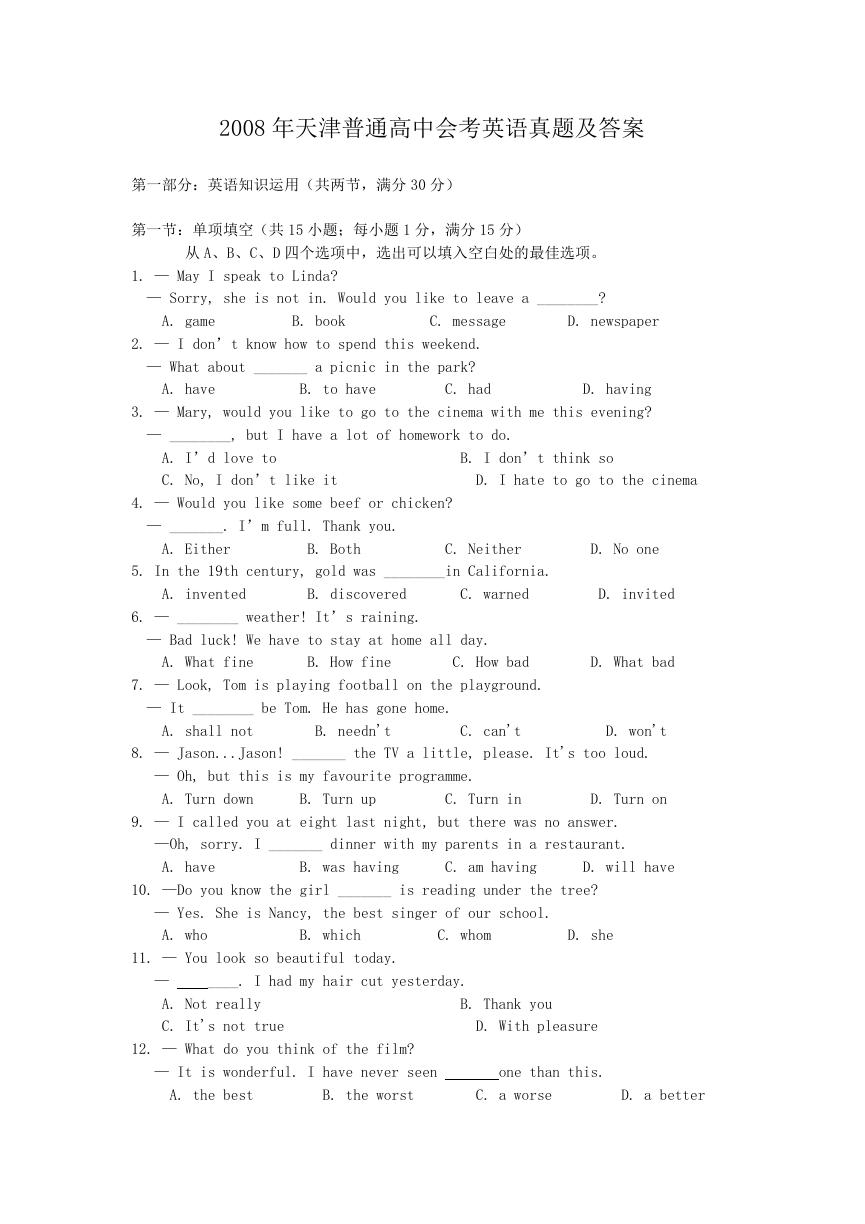
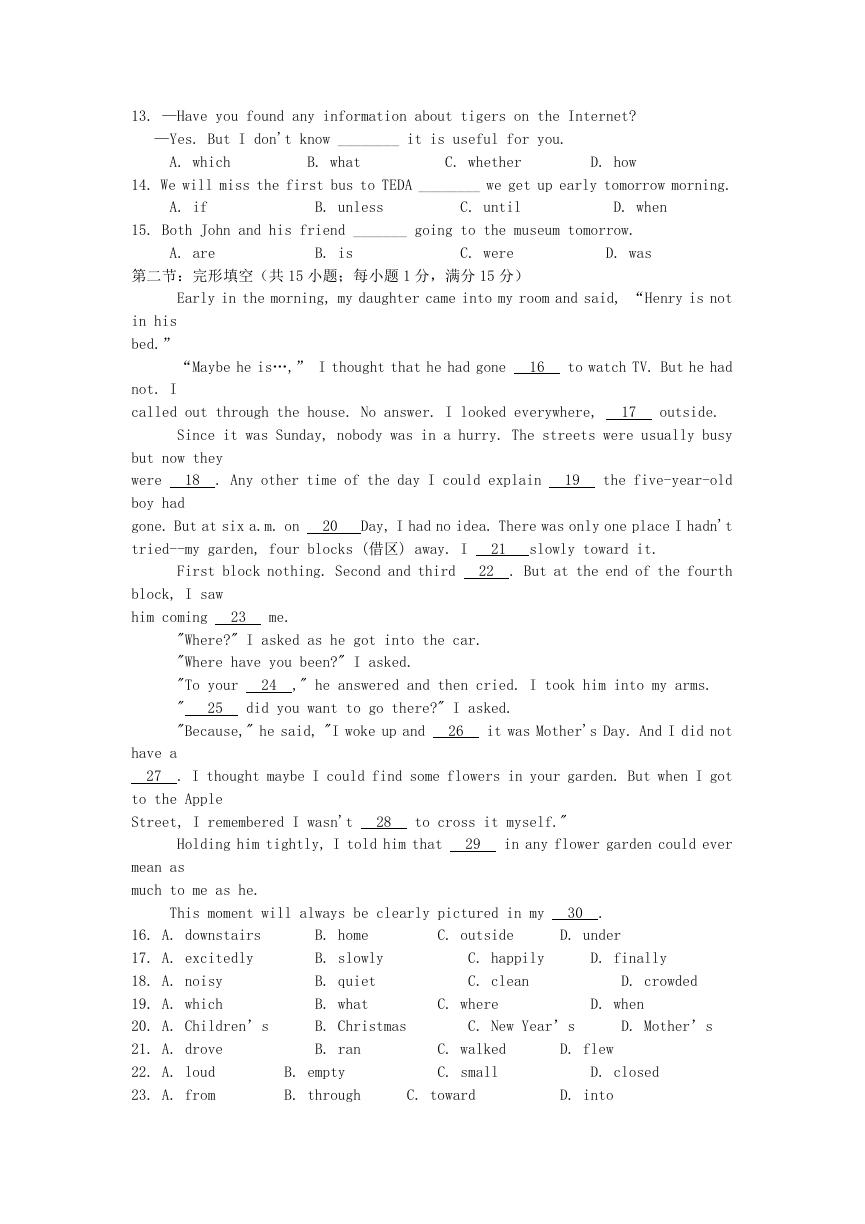
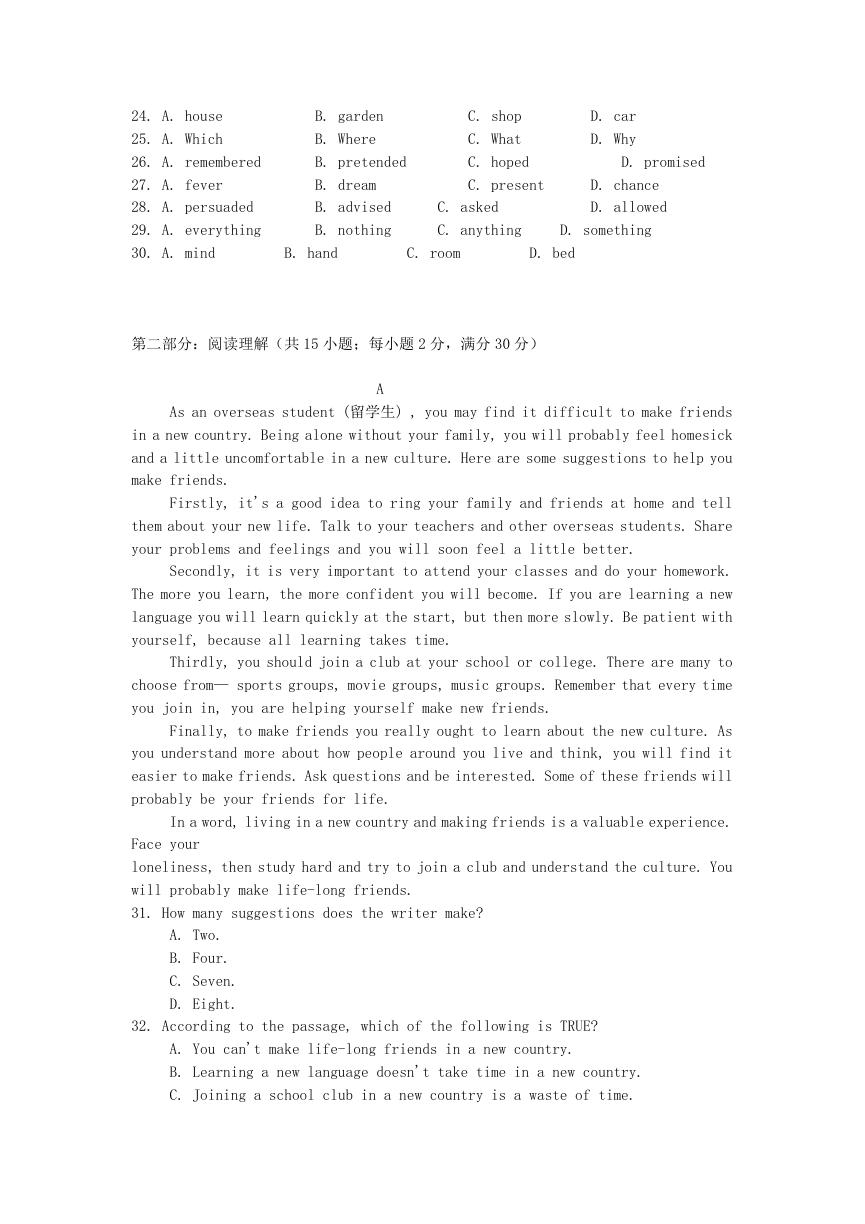
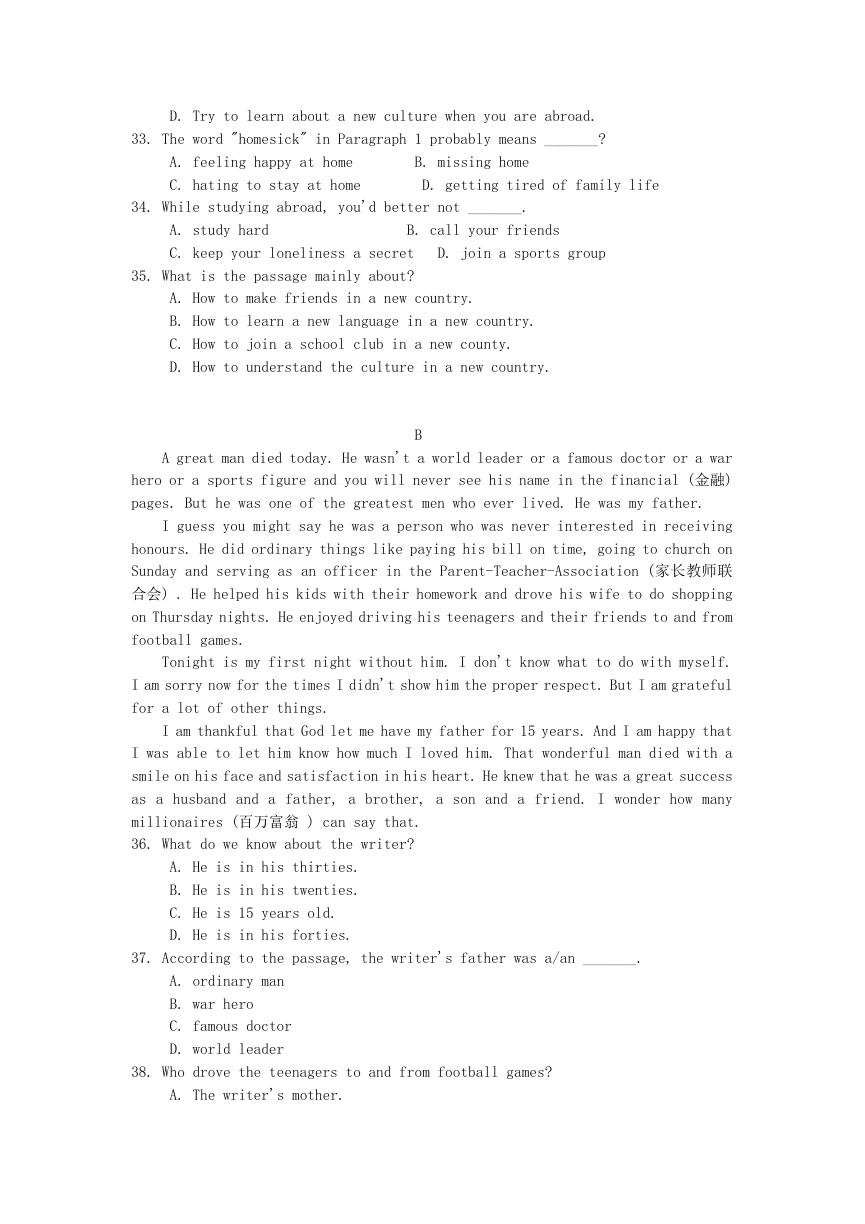
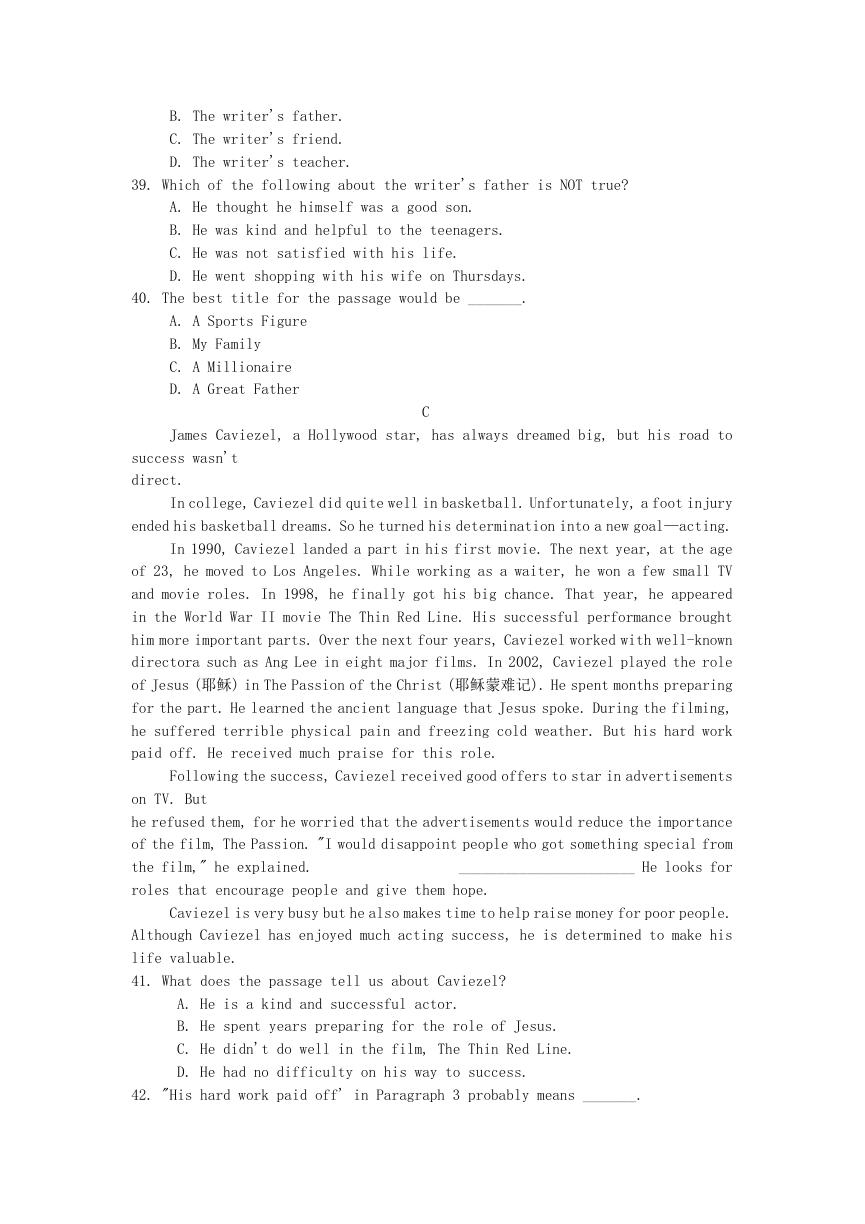
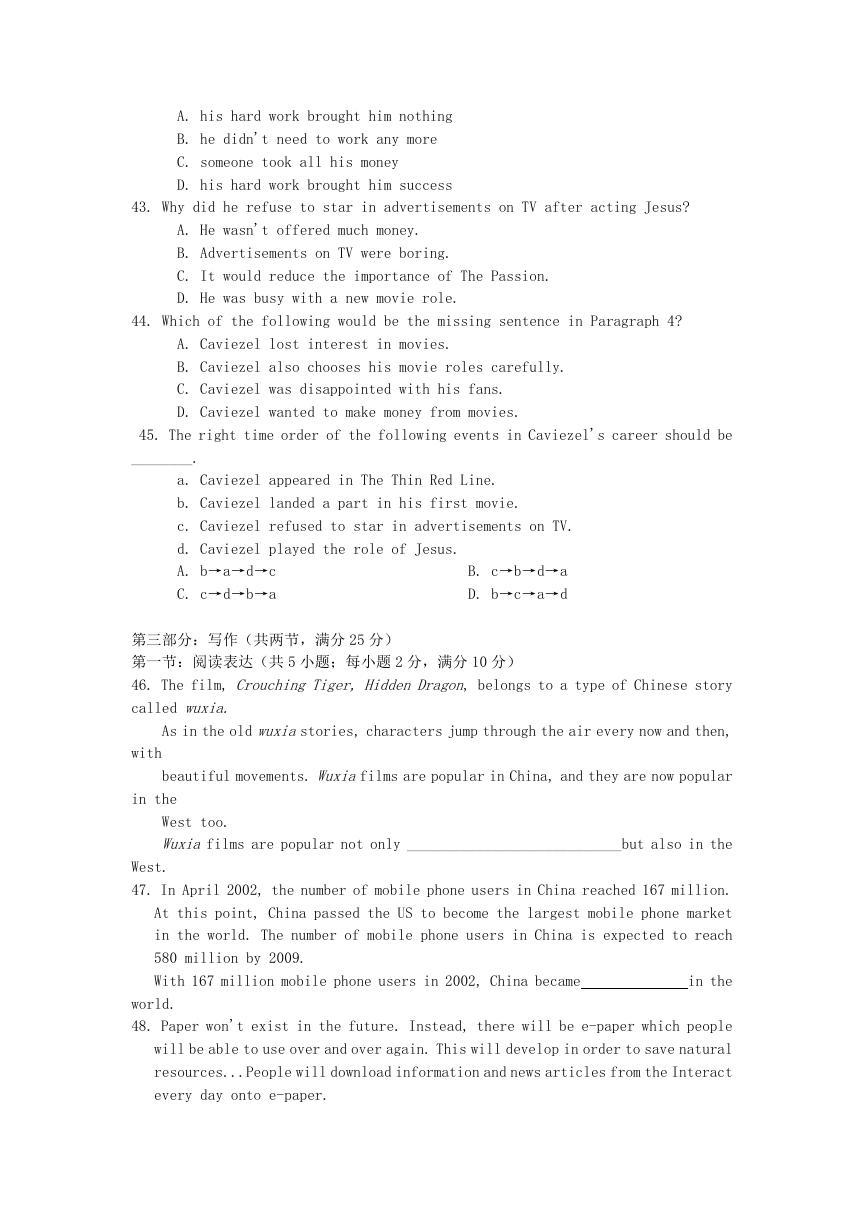
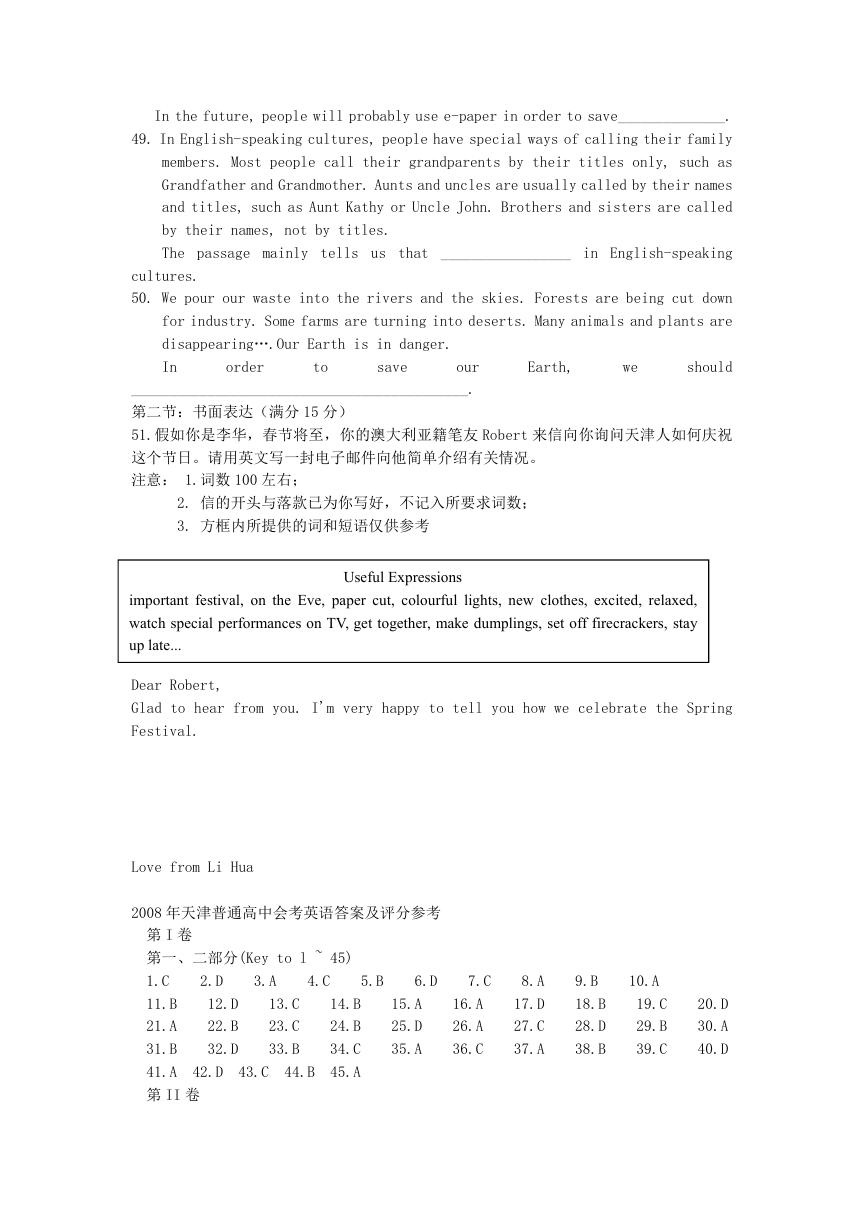









 2023年江西萍乡中考道德与法治真题及答案.doc
2023年江西萍乡中考道德与法治真题及答案.doc 2012年重庆南川中考生物真题及答案.doc
2012年重庆南川中考生物真题及答案.doc 2013年江西师范大学地理学综合及文艺理论基础考研真题.doc
2013年江西师范大学地理学综合及文艺理论基础考研真题.doc 2020年四川甘孜小升初语文真题及答案I卷.doc
2020年四川甘孜小升初语文真题及答案I卷.doc 2020年注册岩土工程师专业基础考试真题及答案.doc
2020年注册岩土工程师专业基础考试真题及答案.doc 2023-2024学年福建省厦门市九年级上学期数学月考试题及答案.doc
2023-2024学年福建省厦门市九年级上学期数学月考试题及答案.doc 2021-2022学年辽宁省沈阳市大东区九年级上学期语文期末试题及答案.doc
2021-2022学年辽宁省沈阳市大东区九年级上学期语文期末试题及答案.doc 2022-2023学年北京东城区初三第一学期物理期末试卷及答案.doc
2022-2023学年北京东城区初三第一学期物理期末试卷及答案.doc 2018上半年江西教师资格初中地理学科知识与教学能力真题及答案.doc
2018上半年江西教师资格初中地理学科知识与教学能力真题及答案.doc 2012年河北国家公务员申论考试真题及答案-省级.doc
2012年河北国家公务员申论考试真题及答案-省级.doc 2020-2021学年江苏省扬州市江都区邵樊片九年级上学期数学第一次质量检测试题及答案.doc
2020-2021学年江苏省扬州市江都区邵樊片九年级上学期数学第一次质量检测试题及答案.doc 2022下半年黑龙江教师资格证中学综合素质真题及答案.doc
2022下半年黑龙江教师资格证中学综合素质真题及答案.doc